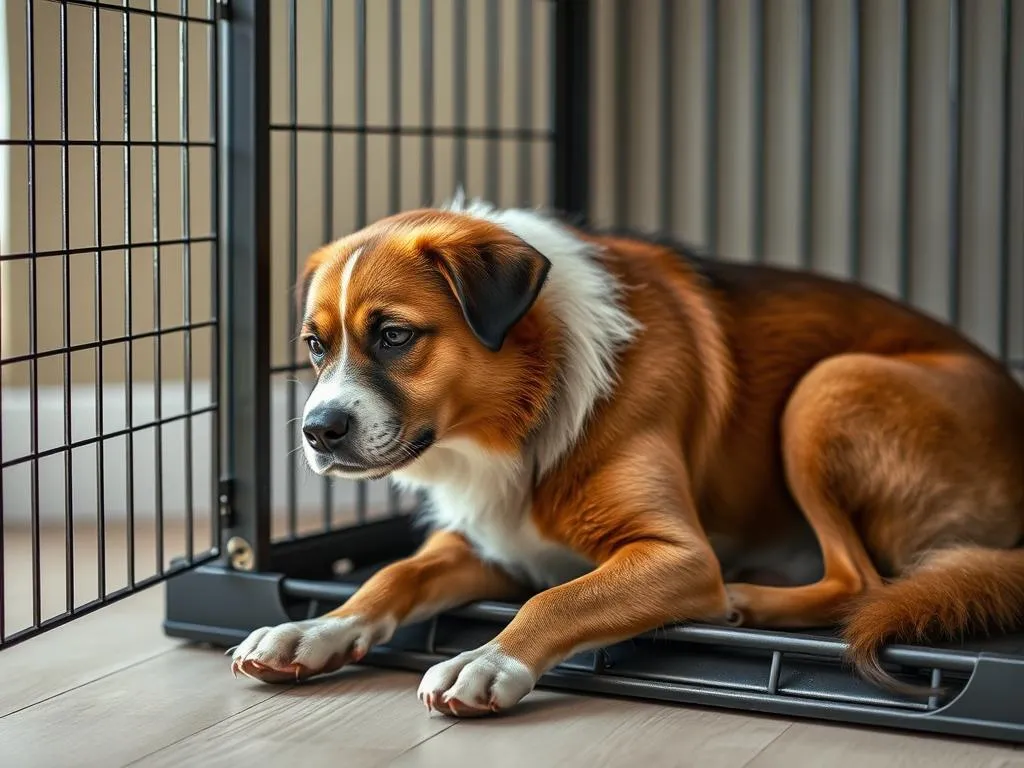
Introduction
Dog health care is crucial for ensuring our furry friends lead happy, healthy lives. However, many dog owners encounter challenges that can affect both the well-being of their pets and their own peace of mind. One such issue is when a dog keeps peeing in the crate. This can be a frustrating problem with emotional and practical implications, leading to stress for both the dog and the owner. Understanding the underlying reasons for this behavior is essential for finding effective solutions.
Understanding Canine Behavior
Normal Urination Patterns
Dogs typically need to urinate several times a day, depending on factors such as their age, size, and overall health. Puppies may require more frequent bathroom breaks, while adult dogs might manage every four to six hours. Senior dogs often face challenges related to bladder control, leading to more frequent urination. Understanding your dog’s normal patterns is key to recognizing when something is amiss.
Reasons for Urination in Crate
When a dog keeps peeing in the crate, it can stem from various factors:
- Stress or Anxiety: Dogs may associate their crate with negative experiences, leading to stress-induced urination.
- Lack of Proper Crate Training: Inadequate training can result in confusion about where it’s appropriate to relieve themselves.
- Health Issues: Conditions such as urinary tract infections (UTIs) or bladder stones can lead to increased urination.
- Behavioral Issues: Some dogs may urinate submissively, which is often a response to fear or anxiety.
Understanding these factors can help owners address the issue effectively.
Common Causes of Crate Peeing
Inadequate House Training
House training is fundamental to a dog’s upbringing. If your dog is still learning where to go, they may not have developed the control necessary to hold it while in the crate. Signs that house training is needed or requires reinforcement include:
- Frequent accidents inside the house
- Signs of confusion when taken outside
- Reluctance to go outside for bathroom breaks
Medical Conditions
Several medical issues can lead to frequent urination, including:
- Urinary Tract Infections (UTIs): Common in dogs, UTIs can cause increased urgency and frequency of urination.
- Diabetes: This condition can lead to excessive thirst and urination.
- Kidney Disease: Dogs with kidney issues may struggle to retain fluids, leading to more frequent urination.
If you suspect a medical condition, it’s essential to seek veterinary advice promptly.
Anxiety and Stress
Anxiety is a significant factor in many behavioral issues in dogs. Signs of anxiety include:
- Excessive barking or whining
- Destructive behaviors
- Reluctance to enter the crate
Environmental factors, such as loud noises or separation from owners, can contribute to stress. Understanding these triggers is crucial in addressing the problem.
Age-Related Issues
Both puppies and senior dogs may face unique challenges when it comes to urination:
- Puppies: They have small bladders and limited control, requiring regular bathroom breaks.
- Senior Dogs: Aging can lead to decreased bladder control, making it harder for them to hold their urine.
Recognizing these age-related issues helps owners be more patient and understanding.
Assessing Your Dog’s Health
Observing Symptoms
Monitoring your dog’s urination habits is vital. Keep an eye on:
- Frequency of urination in and out of the crate
- Changes in the color or odor of urine
- Signs of discomfort while urinating
Noticing these symptoms can help you identify potential health problems.
Consulting a Veterinarian
Professional evaluation is crucial if you suspect health issues. During a veterinary visit, expect:
- A thorough examination
- Possible urinalysis
- Discussion of your dog’s behavior and health history
This professional insight can guide you in addressing the urination problem effectively.
Solutions and Strategies
Improving Crate Training
Effective crate training can significantly reduce the likelihood of your dog peeing in the crate. Here are some tips:
- Positive Reinforcement: Use treats and praise to reward your dog for entering the crate without incident.
- Gradual Acclimation: Start by allowing your dog to spend short periods in the crate, gradually increasing the duration as they become more comfortable.
- Proper Sizing: Ensure the crate is appropriately sized. Too much space can encourage urination in one corner while sleeping in another.
Adjusting Routine and Environment
Creating a comfortable and structured environment can help alleviate the issue:
- Regular Bathroom Schedule: Establish a consistent routine for bathroom breaks, ideally after meals, playtime, and waking up.
- Comfortable Crate Environment: Make the crate inviting with soft bedding and toys, reducing anxiety associated with being confined.
Addressing Health Concerns
If a medical condition is identified, various treatment options may be available:
- Medication: Antibiotics for UTIs or other medications as prescribed by the veterinarian.
- Dietary Changes: Special diets may support urinary health, particularly for dogs with chronic conditions.
Always consult your veterinarian before making any dietary changes.
Managing Anxiety and Stress
Reducing anxiety in your dog can help minimize crate peeing. Techniques include:
- Desensitization: Gradually expose your dog to the crate while providing treats and praise to create positive associations.
- Calming Aids: Consider using calming collars, pheromone diffusers, or anxiety wraps that provide comfort during stressful times.
- Creating a Safe Space: Designate an area in your home where your dog feels secure, allowing them to retreat when anxious.
When to Seek Professional Help
Signs that Indicate a Need for Help
Persistent issues despite training efforts can signal the need for professional intervention. Watch for:
- Frequent accidents in the crate even after established routines
- Severe anxiety or behavioral changes that impact quality of life
Types of Professionals to Consult
Various professionals can offer assistance:
- Veterinarians: They can diagnose health issues related to urination.
- Animal Behaviorists: They specialize in behavioral issues and can provide tailored training plans.
- Trainers Specializing in Behavior Modification: These trainers can help address specific behavioral challenges, including crate peeing.
Preventive Measures
Regular Vet Check-ups
Routine health screenings are essential to catch potential issues early. Regular veterinary visits can help ensure your dog remains healthy and identify any concerns before they become serious.
Ongoing Training and Socialization
Continuing your dog’s training and socialization helps reinforce good behaviors. Regular interaction with other dogs and people can reduce anxiety and improve overall behavior.
Monitoring Changes in Behavior
Keeping a diary of changes in urination patterns or behavior can help you identify triggers or issues over time. This record can be invaluable when discussing concerns with your veterinarian or a trainer.
Conclusion
Understanding why your dog keeps peeing in the crate involves recognizing various factors, from health concerns to behavioral issues. By taking a comprehensive approach that includes proper training, routine veterinary care, and environmental adjustments, you can effectively address the problem. Patience and proactive measures are vital in maintaining a happy and healthy environment for your dog.
FAQs
Why does my dog pee in the crate even after being house trained?
If your dog is urinating in the crate despite being house trained, it may be due to anxiety, health issues, or inadequate crate training. Review their routine and consult a veterinarian if necessary.
How often should I take my dog out to prevent crate peeing?
Establish a regular bathroom schedule, ideally taking your dog out every four to six hours, especially after meals and playtime.
Can anxiety cause my dog to pee in the crate?
Yes, anxiety can lead to stress-induced urination. If you notice signs of anxiety, consider addressing the underlying causes and consult a professional if needed.
What should I do if my dog has a UTI?
If you suspect your dog has a urinary tract infection, consult your veterinarian immediately. They can provide appropriate diagnosis and treatment.
Is it normal for puppies to pee in their crate?
Puppies have small bladders and limited control, making it normal for them to occasionally urinate in their crate. Establishing a consistent routine can help reduce accidents as they grow.









